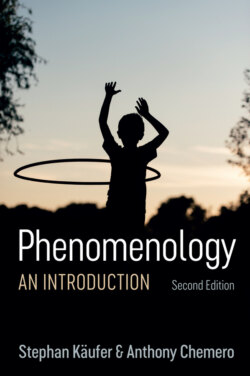Phenomenology

Реклама. ООО «ЛитРес», ИНН: 7719571260.
Оглавление
Anthony Chemero. Phenomenology
CONTENTS
Guide
List of Illustrations
Pages
Phenomenology. An Introduction
Acknowledgments
Introduction
What you will not find in this book
Phenomenology now
Why study phenomenology?
Overview
Notes on the second edition
1 Immanuel Kant: Eighteenth- and Nineteenth-Century Background
1.1 Kant’s critical philosophy
1.2 Intuitions and concepts
1.3 The transcendental deduction
1.4 Kantian themes in phenomenology
Key terms
Further reading
2 The Rise of Experimental Psychology
2.1 Wilhelm Wundt and the rise of scientific psychology
2.2 William James and functionalism
2.3 The structuralism–functionalism debate
Key terms
Further reading
3 Edmund Husserl and Transcendental Phenomenology. 3.1 Transcendental phenomenology
3.2 Franz Brentano
3.3 Between logic and psychology
3.4 Ideas
3.4.1 Intentionality
3.4.2 Transcendental reduction
3.4.3 Eidetic reduction
3.4.4 Hyle, fulfillment, and adumbrations
3.5 The body
3.5.1 The role of the body in perception
3.5.2 Apperception of the body
3.6 Phenomenology of time consciousness
3.6.1 The basic problem
3.6.2 Kant and Brentano
3.6.3 Retention and protention
3.6.4 The temporal structure of the self
Key terms
Further reading
4 Martin Heidegger and Existential Phenomenology
4.1 The intelligibility of the everyday world. 4.1.1 Equipment
4.1.2 Zuhanden and vorhanden
4.2 Descartes and occurrentness
4.3 Being-in-the-world
4.3.1 Skills
4.3.2 Disclosedness
4.3.3 Disposedness
4.4 Being-with others and the anyone
4.5 The existential conception of the self. 4.5.1 The self of being-in-the-world
4.5.2 Temporality and the self
4.5.3 Existential possibilities
4.5.4 Thrown projection
4.5.5 Self-understanding vs. social roles
4.6 Death, guilt, and authenticity
Key terms
Further reading
5 Gestalt Psychology
5.1 Gestalt criticisms of atomistic psychology. 5.1.1 Against the bundle and constancy hypotheses
5.1.2 Gestalt qualities
5.2 Perception and the environment. 5.2.1 Perception and cognition
5.2.2 Lewin on motivation
5.3 Influence of Gestalt psychology
Key terms
Further reading
6 Aron Gurwitsch: Merging Gestalt Psychology and Phenomenology
6.1 Phenomenology of Thematics and of the Pure Ego
6.1.1 Theme and the field of consciousness
6.1.2 Hyle and noema
6.1.3 The non-egological conception of consciousness
6.2 Others and the social world
Key terms
Further reading
7 Jean-Paul Sartre: Phenomenological Existentialism
7.1 The Transcendence of the Ego
7.2 The Imagination and The Imaginary
7.3 Being and Nothingness
7.3.1 Being in-itself, being for-itself, and nothingness
7.3.2 Anguish, freedom, and vertigo
7.3.3 Bad faith
7.3.4 Sartre on perception and the body
Key terms
Further reading
8 Maurice Merleau-Ponty: The Body and Perception
8.1 Phenomenology of Perception
8.2 Phenomenology, psychology, and the phenomenal field
8.3 The lived body
8.3.1 The body schema
8.3.2 The case of Schneider
8.3.3 Motor intentionality
8.3.4 Examples
8.4 Perceptual constancy and natural objects
Key terms
Further reading
9 Critical Phenomenology. 9.1 The path not taken
9.2 Phenomenology and gender
9.3 Phenomenology and race
9.4 Conclusion
Key terms
Further reading
10 James J. Gibson and Ecological Psychology
10.1 Gibson’s early work: Two examples. 10.1.1 Perceived valences
10.1.2 Learning
10.2 The ecological approach
10.3 Ecological ontology
10.4 Affordances and invitations
Key terms
Further reading
11 Hubert Dreyfus and the Phenomenological Critique of Cognitivism
11.1 The cognitive revolution and cognitive science
11.2 “Alchemy and artificial intelligence”
11.3 What Computers Can’t Do
11.3.1 The biological assumption
11.3.2 The psychological assumption
11.3.3 The epistemological assumption
11.3.4 The ontological assumption
11.4 Heideggerian artificial intelligence
Key terms
Further reading
12 Enactivism and the Embodied Mind. 12.1 Embodied, embedded, extended, enactive
12.2 The original enactivism
12.3 Other enactivisms: The sensorimotor approach and radical enactivism
12.4 Enactivism as a philosophy of nature
Key terms
Further reading
13 Phenomenological Cognitive Science. 13.1 The frame problem
13.2 Radical embodied cognitive science
13.3 Dynamical systems theory
13.4 Heideggerian cognitive science
13.5 The future of scientific phenomenology
Key terms
Further reading
References
Index. A
B
C
D
E
F
G
H
I
J
K
L
M
N
O
P
R
S
T
U
V
W
Y
Z
POLITY END USER LICENSE AGREEMENT
Отрывок из книги
Stephan Käufer and Anthony Chemero
We taught seminars on this material at Franklin & Marshall College, Carleton College, and at the University of Cincinnati. We are grateful to students in those seminars, and to Jenefer Robinson, for helping us to present the material more clearly.
.....
The first of these is the idea that subjective structures somehow constitute the objects of experience. In most of his writings, especially early on, Husserl takes his work to be concerned with spelling out constitutive structures of experience. He maintains much of Kant’s cognitivist approach, that is, the idea that the constitutive structures derive from the mental processes that make up conscious experience. But he thinks that these structures are more prevalent and varied than Kant’s comparatively austere list of twelve categories. In some of his later work, Husserl develops other approaches in his phenomenology that are closer to the views of Heidegger and Merleau-Ponty.
Both Heidegger and Merleau-Ponty sharply reject the cognitivism of Kant’s philosophy. They do not think that the basic structures that enable us to experience an objective world are conceptual, or even primarily mental. They do not think of object-constitution in Kantian or Husserlian terms. Nevertheless they, too, argue that a hidden, pre-personal structure makes experience possible and that it is the job of philosophy to uncover and describe this structure. Rather than concepts, they argue that pre-personal conditions of intelligibility consist of our bodily habits and skills, developed and deployed in a specific cultural setting.
.....